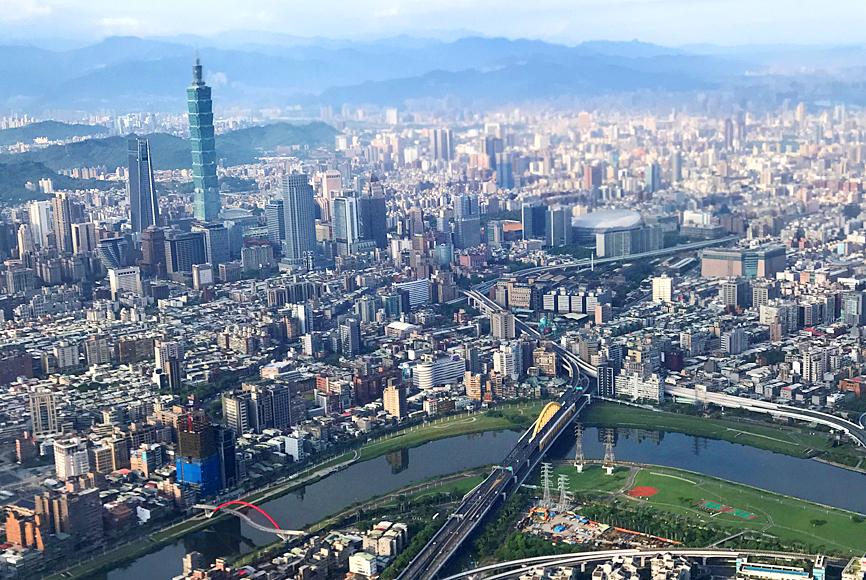Taiwan was on Wednesday named the only country in Asia with an open civic space for a fourth consecutive year, a report published by the human rights organization Civicus said.
The report, titled People Power Under Attack 2021, said that of 26 countries and territories in Asia, Taiwan remains the only one rated as “open” for the fourth time since 2018.
Taiwanese authorities are tolerant of criticism from civil society groups, which are able to form and operate freely without hindrance, Civicus said in a statement.

Photo: Tyrone Siu, Reuters
However, there are concerns about attempts to ban books that apparently glorify Beijing and to criminalize the display of the five-star flag of the People’s Republic of China, it added.
“Further, there is a need to revise the Assembly and Parade Act, which continues to disproportionately restrict people’s right to hold protests close to specified areas, such as the Executive Yuan, courts at all levels and foreign embassies and the need to obtain approval from the government,” Civicus said.
The annual report assesses civic space based on freedom of association, peaceful assembly and expression. Each country is placed in one of five categories: open, narrowed, obstructed, repressed or closed.
The report said that the most widespread civic space restraints in at least 21 Asian countries this year has been the use of restrictive laws to criminalize and prosecute human rights defenders. Other restraints include harassment, torture or ill-treatment and the detention of journalists, advocates and critics.
Four Asian countries — China, Laos, North Korea and Vietnam — are rated as closed, while 11 are ranked as repressed and seven as obstructed. Japan, Mongolia and South Korea are rated narrowed.
In China, where civic space is closed, the government has continued to detain scores of human rights defenders for broadly defined and vaguely worded offenses, while in Hong Kong, the newly-installed National Security Law has been weaponized to target journalists and democracy advocates, the Civicus report said.
A total of 197 countries and territories were surveyed, but only 39 were rated open, down from 42 last year, while 25 countries ranked closed, up from 23, most of which are located in the Middle East and Africa.
Forty-three countries were rated obstructed, and 49 countries ranked repressed.
The report said that 88.5 percent of the world’s population live in countries rated as closed, repressed or obstructed, while only 3.1 percent live in countries ranked as open.
Established in South Africa in 1993, Civicus is a global alliance of civil society organizations and advocates dedicated to bolstering citizen action and civil society worldwide.
Its Civicus Monitor research tool provides a comprehensive assessment of the conditions for civil society in 197 countries and territories.

The Ministry of Education (MOE) is to launch a new program to encourage international students to stay in Taiwan and explore job opportunities here after graduation, Deputy Minister of Education Yeh Ping-cheng (葉丙成) said on Friday. The government would provide full scholarships for international students to further their studies for two years in Taiwan, so those who want to pursue a master’s degree can consider applying for the program, he said. The fields included are science, technology, engineering, mathematics, semiconductors and finance, Yeh added. The program, called “Intense 2+2,” would also assist international students who completed the two years of further studies in

Former president Tsai Ing-wen (蔡英文) departed for Europe on Friday night, with planned stops in Lithuania and Denmark. Tsai arrived at Taiwan Taoyuan International Airport on Friday night, but did not speak to reporters before departing. Tsai wrote on social media later that the purpose of the trip was to reaffirm the commitment of Taiwanese to working with democratic allies to promote regional security and stability, upholding freedom and democracy, and defending their homeland. She also expressed hope that through joint efforts, Taiwan and Europe would continue to be partners building up economic resilience on the global stage. The former president was to first

Taiwan will now have four additional national holidays after the Legislative Yuan passed an amendment today, which also made Labor Day a national holiday for all sectors. The Chinese Nationalist Party (KMT) and Taiwan People’s Party (TPP) used their majority in the Legislative Yuan to pass the amendment to the Act on Implementing Memorial Days and State Holidays (紀念日及節日實施辦法), which the parties jointly proposed, in its third and final reading today. The legislature passed the bill to amend the act, which is currently enforced administratively, raising it to the legal level. The new legislation recognizes Confucius’ birthday on Sept. 28, the

MORE NEEDED: Recall drives against legislators in Miaoli’s two districts and Hsinchu’s second district were still a few thousand signatures short of the second-stage threshold Campaigners aiming to recall Chinese Nationalist Party (KMT) legislators yesterday said they expect success in 30 out of 35 districts where drives have passed the second-stage threshold, which would mark a record number of recall votes held at once. Hsinchu County recall campaigners yesterday announced that they reached the second-stage threshold in the recall effort against Legislator Lin Szu-ming (林思銘). A total of 26,414 signatures have been gathered over the past two months, surpassing the 10 percent threshold of 23,287 in Hsinchu County’s second electoral district, chief campaigner Hsieh Ting-ting (謝婷婷) said. “Our target is to gather an additional 1,500 signatures to reach